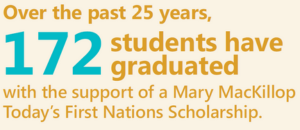
Our Scholarship program works to address systemic barriers to education by increasing access to tertiary studies for First Nations students through providing financial support. This helps to ensure that scholarship recipients can achieve a better quality of life for themselves, their families and communities. Through extensive consultations with students, mentors and supervisors from First Nations university community centres, appropriate and effective support mechanisms have been developed to meet the needs of scholarship recipients.
Since it began in 1998, there have been many successful graduates from our scholarship program, most of whom were the first in their family to gain a tertiary education. The scholarship is designed to be flexible and supportive, accommodating all fields of study for the duration of the course.
 Mary MacKillop Today has been working in partnership with Good Shepherd Australia New Zealand (GSANZ) since 2008. During this time Good Shepherd have supported many First Nations women to study at tertiary level through the Good Shepherd Reconciliation Scholarship for women. The scholarship is dedicated to empowering First Nations women to access and achieve their academic goals. This has resulted in First Nations women across Australia successfully completing tertiary studies in fields as varied as Medicine, Education, Arts, Social work, Anthropology, Psychology and Law.
Mary MacKillop Today has been working in partnership with Good Shepherd Australia New Zealand (GSANZ) since 2008. During this time Good Shepherd have supported many First Nations women to study at tertiary level through the Good Shepherd Reconciliation Scholarship for women. The scholarship is dedicated to empowering First Nations women to access and achieve their academic goals. This has resulted in First Nations women across Australia successfully completing tertiary studies in fields as varied as Medicine, Education, Arts, Social work, Anthropology, Psychology and Law.
Impact on Students
 The completion of a tertiary degree increases students’ abilities to overcome disadvantage; empower themselves; effect social change; and positively impact future generations of learners.
The completion of a tertiary degree increases students’ abilities to overcome disadvantage; empower themselves; effect social change; and positively impact future generations of learners. - The knowledge and skills acquired through education improves students earning potential and ability to invest wisely in their future and that of their families.
- The scholarships help relieve physical and emotional pressures associated with financial struggle, reducing the drop-out rate of First Nations students at tertiary education level.
- The beneficiaries have and continue to play an instrumental role in the design and redesign of the program, allowing us to improve and redesign as and if necessary.
Stories from our blog
- 4 March 2024 – “This scholarship has truly changed the way I study”
- 11 May 2023 – Supporting First Nations Scholarships – Tegan’s Story
- 9 March 2023 – Scholarships to help people flourish
- 1 March 2022 – Meet Bridie, First Nations Scholarship recipient and Honours student
- 1 September 2020 – Meet Hayden, First Nations Scholarship recipient
- 28 January 2020 – Meet April, the first in her family to go to University!
- 5 February 2019 – You helped Aiden graduate!
- 25 September 2018 – Linda’s Story – giving back to her community!








